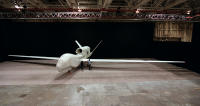
LATEST AUSTRALIAN BUSINESS NEWS
 Australia's future military operations will be supported by forces of robots and unmanned vehicles which will be highly integrated and controlled by defence personnel from a distance, Defence Minister Robert Hill said today. Speaking at the opening of the Amazing World of Science event in Canberra today, Senator Hill said the Government was investing more and more on research and development of unmanned vehicle technology for use in future operations and for surveillance purposes.
Australia's future military operations will be supported by forces of robots and unmanned vehicles which will be highly integrated and controlled by defence personnel from a distance, Defence Minister Robert Hill said today. Speaking at the opening of the Amazing World of Science event in Canberra today, Senator Hill said the Government was investing more and more on research and development of unmanned vehicle technology for use in future operations and for surveillance purposes. "These new intelligent and largely autonomous systems will in the future be able to carry out hazardous tasks traditionally reserved for warfighters which will reduce exposure and risks to Australian Defence Force personnel," Senator Hill said. "This will be a huge leap in capability for our Defence Force. I envisage that in the future unmanned battlespace vehicles will be deployed in fleets to gather information, conduct surveillance, sweep for mines, defuse bombs and carry out a range of dangerous tasks. "The autonomous systems will be able to provide the ADF with increased access to its areas of operation, especially in hostile and difficult terrain.
"This advance in technology has the potential to increase the operational effectiveness of our troops and enhance surveillance capabilities while reducing risk to personnel and reducing the cost of operations." Research into such autonomous vehicles is being undertaken by the Defence Science and Technology Organisation (DSTO) under its Automation of the Battlespace Initiative (ABSI). "This is a long range research program to enhance the ADF's capabilities by dramatically increasing the autonomy, performance and affordability of these unmanned vehicles," Senator Hill said. "Trials so far have demonstrated that these autonomous vehicles can work together in cooperative way to complete assigned tasks. "DSTO is exploring the concept of expendable autonomous vehicles which will be inexpensive to manufacture and easy to repair." In time these vehicles will carry integrated communications and other capabilities linking them together and with their controllers. Senator Hill said advances in computing power, electronics, sensors, miniaturisation and smarter software has made it possible to raise automation to a new level.
David